book1 Unit 1 Friendship Using language课件
文档属性
| 名称 | book1 Unit 1 Friendship Using language课件 |
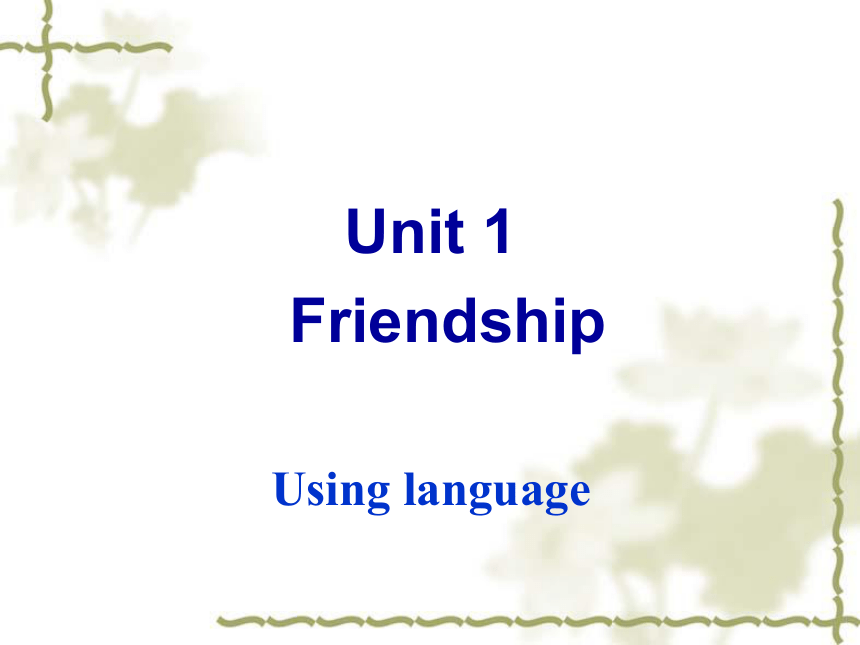
|
|
| 格式 | zip | ||
| 文件大小 | 180.4KB | ||
| 资源类型 | 教案 | ||
| 版本资源 | 人教版(新课程标准) | ||
| 科目 | 英语 | ||
| 更新时间 | 2014-08-20 00:00:00 | ||
图片预览

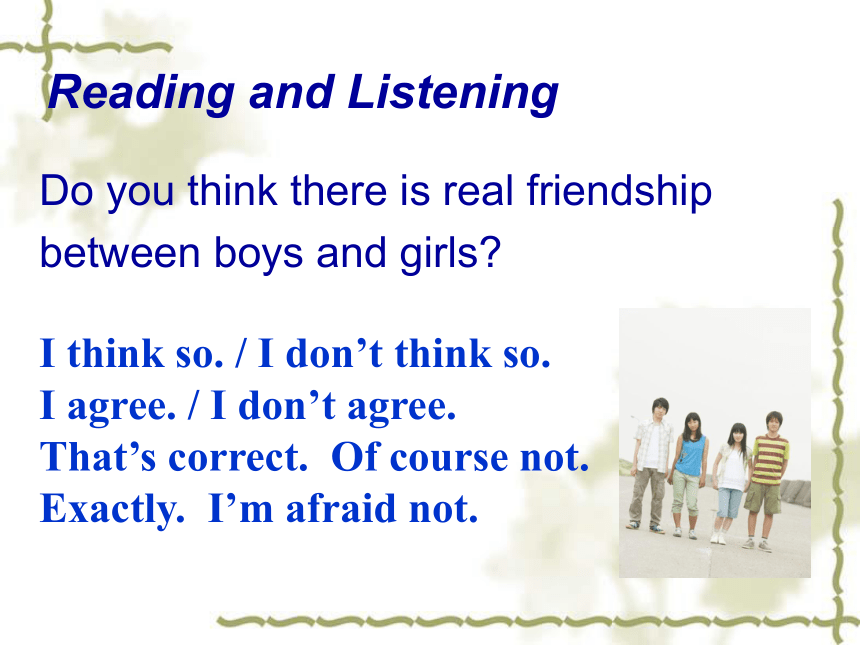

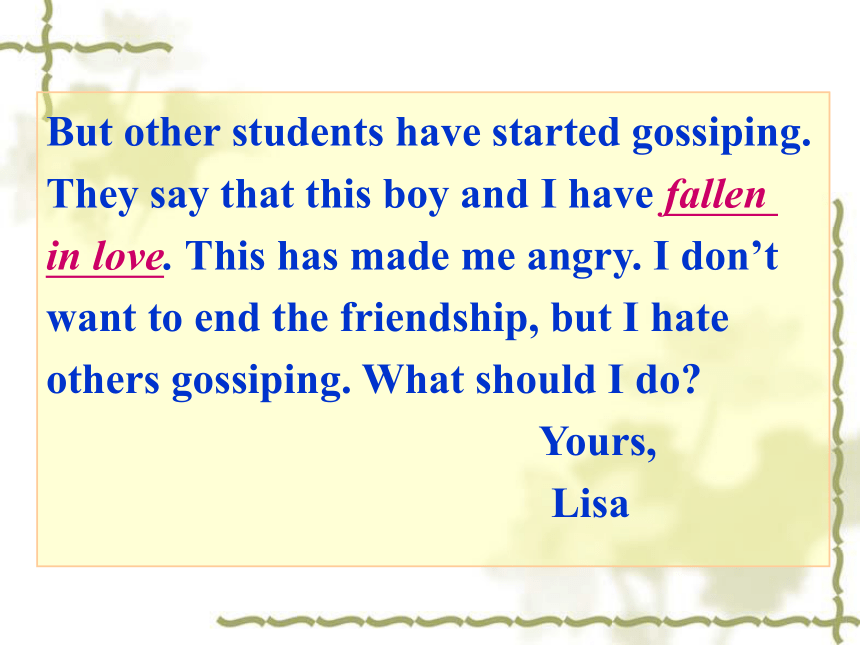
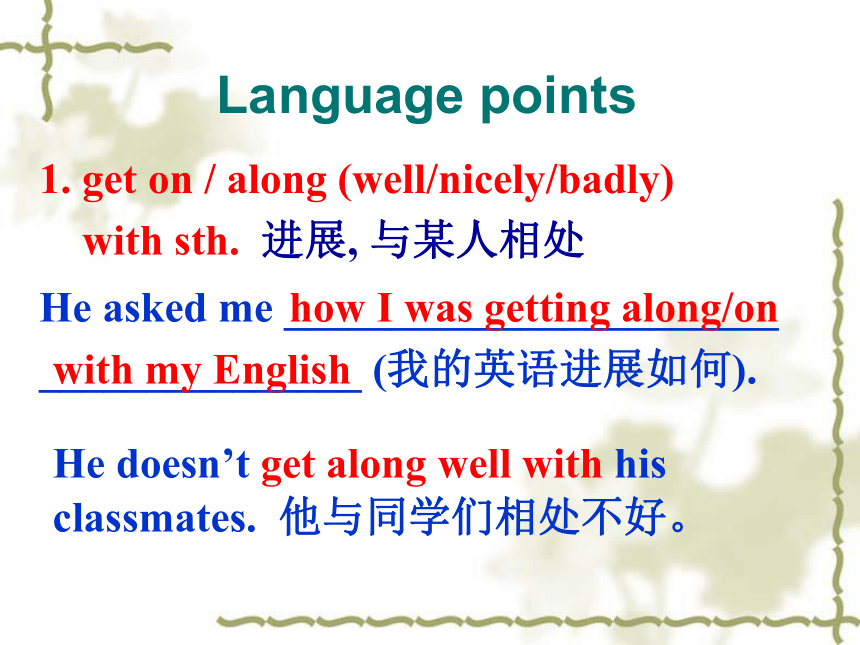
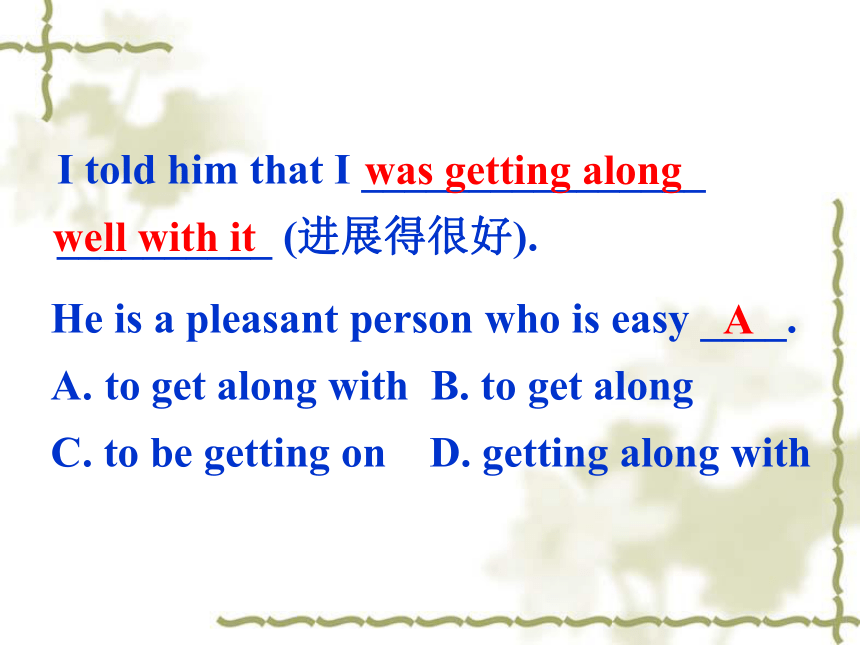
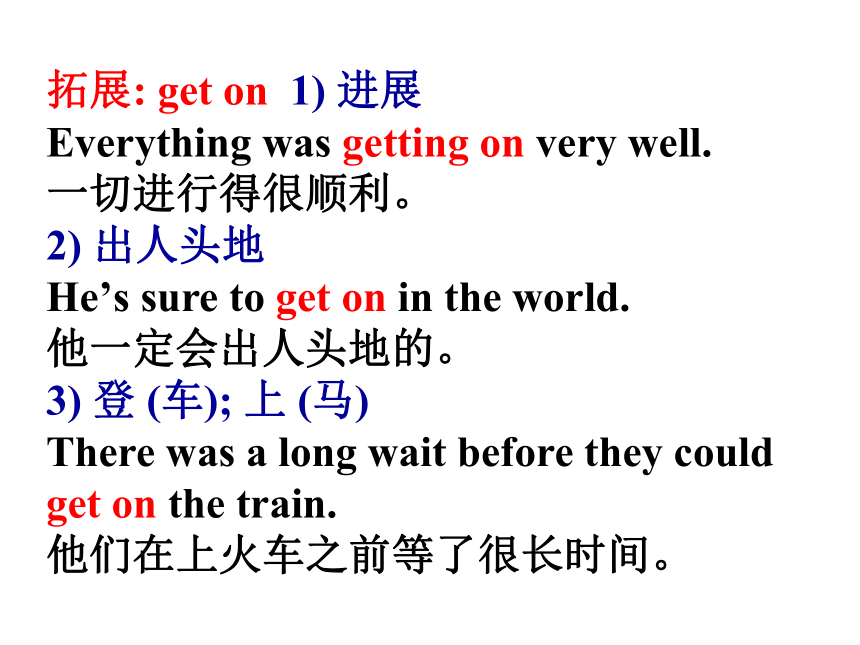
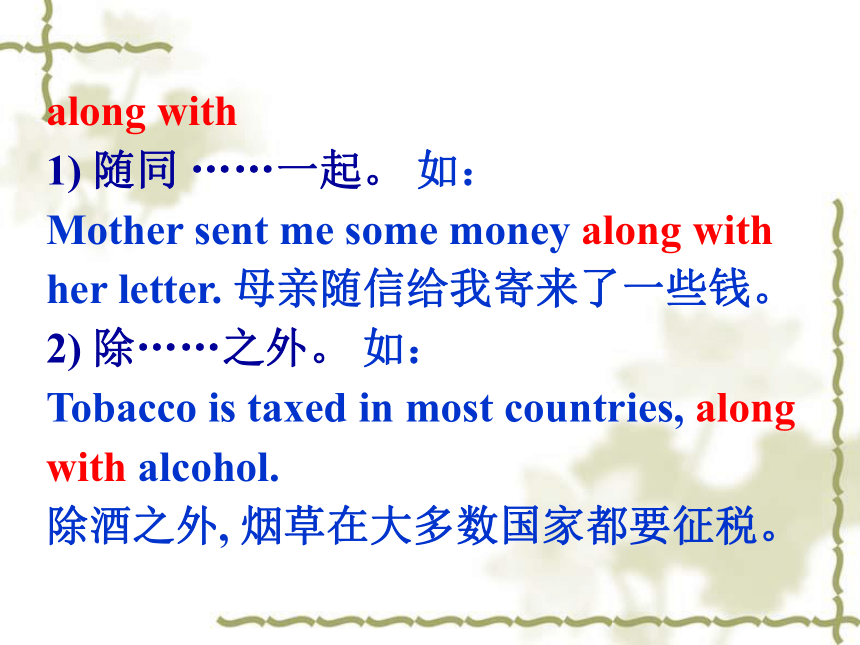
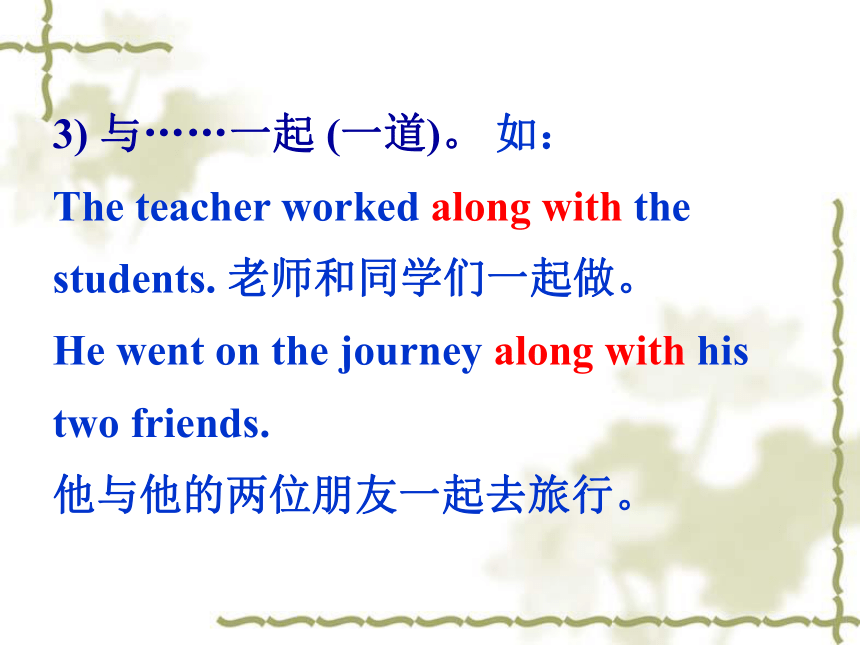
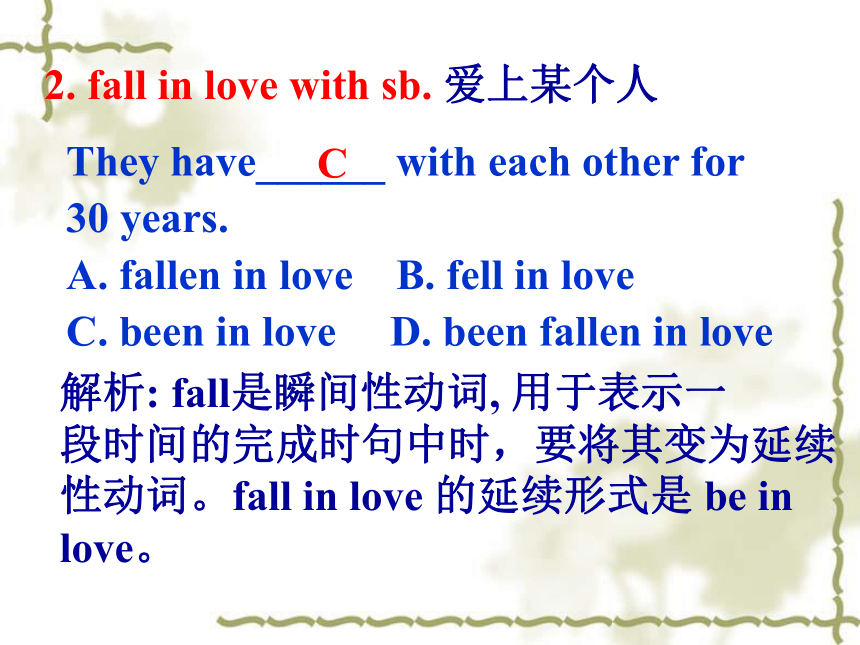
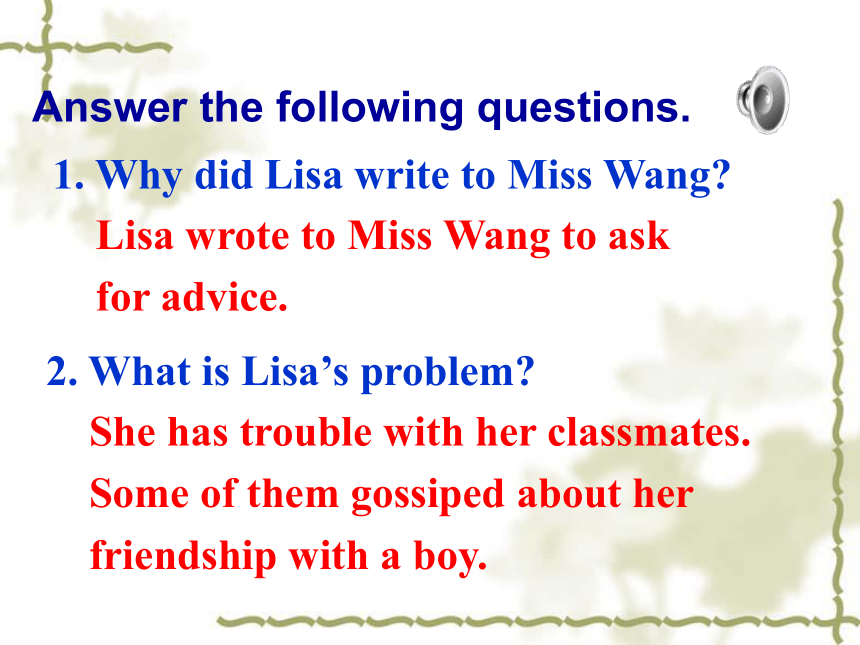
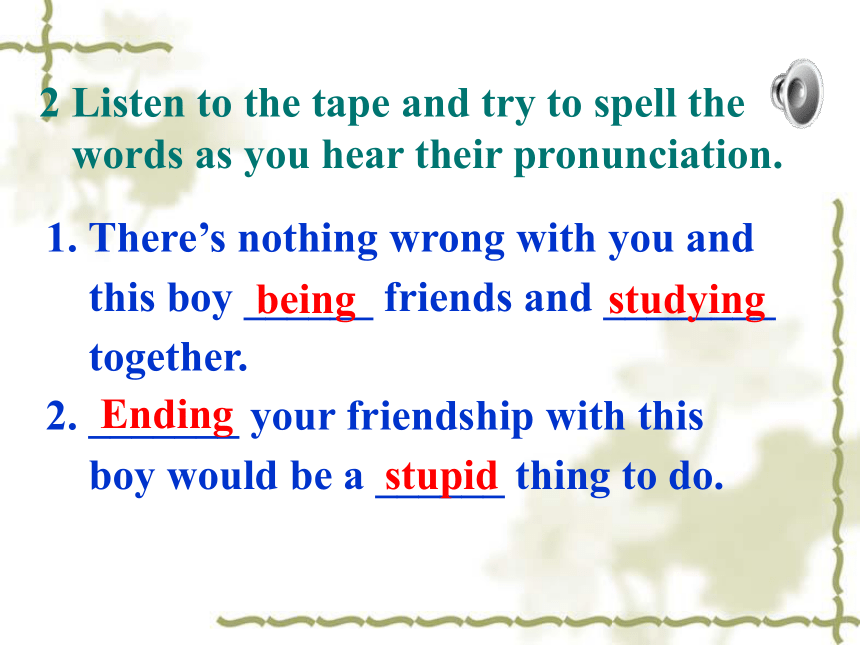
文档简介
课件58张PPT。Unit 1
Friendship
Using languageDo you think there is real friendship between boys and girls?I think so. / I don’t think so.
I agree. / I don’t agree.
That’s correct. Of course not.
Exactly. I’m afraid not.Reading and ListeningDear Miss Wang,
I am having some trouble with my
classmates at the moment. I’m getting
along well with a boy in my class. We
often do homework together and we
enjoy helping each other. We have
become really good friends. 1 Read the letter.But other students have started gossiping.
They say that this boy and I have fallen
in love. This has made me angry. I don’t
want to end the friendship, but I hate
others gossiping. What should I do?
Yours,
LisaHe asked me _______________________ _______________ (我的英语进展如何). how I was getting along/on with my English1. get on / along (well/nicely/badly)
with sth. 进展, 与某人相处 Language pointsHe doesn’t get along well with his classmates. 他与同学们相处不好。I told him that I ________________ __________ (进展得很好). was getting along well with itHe is a pleasant person who is easy ____.
to get along with B. to get along
C. to be getting on D. getting along withA 拓展: get on 1) 进展
Everything was getting on very well.
一切进行得很顺利。
2) 出人头地
He’s sure to get on in the world.
他一定会出人头地的。
3) 登 (车); 上 (马)
There was a long wait before they could get on the train.
他们在上火车之前等了很长时间。along with
1) 随同 ……一起。 如:
Mother sent me some money along with
her letter. 母亲随信给我寄来了一些钱。
2) 除……之外。 如:
Tobacco is taxed in most countries, along
with alcohol.
除酒之外, 烟草在大多数国家都要征税。3) 与……一起 (一道)。 如:
The teacher worked along with the
students. 老师和同学们一起做。
He went on the journey along with his
two friends.
他与他的两位朋友一起去旅行。They have______ with each other for 30 years.
A. fallen in love B. fell in love
C. been in love D. been fallen in love2. fall in love with sb. 爱上某个人 解析: fall是瞬间性动词, 用于表示一
段时间的完成时句中时,要将其变为延续
性动词。fall in love 的延续形式是 be in
love。CAnswer the following questions.1. Why did Lisa write to Miss Wang?
Lisa wrote to Miss Wang to ask
for advice.2. What is Lisa’s problem?
She has trouble with her classmates.
Some of them gossiped about her
friendship with a boy. There’s nothing wrong with you and
this boy ______ friends and ________
together.
_______ your friendship with this
boy would be a ______ thing to do.beingstudyingEndingstupid2 Listen to the tape and try to spell the
words as you hear their pronunciation. 3. Teenagers like to ______, and they
often see something that isn’t real.
4. My advice is to ______ your classmates.
That way you will _____ them that you
are more _________ than they are.gossipignoreshowgrown-up What does Miss Wang say about
their friendship?
She says that ___________________
_______________________________
_______________________________
___________________________ there is nothing wrong in Lisa making friends with a boy. She also thinks that it is possible for a boy and a girl to be good friends.3 Listen to the tape again and use the exercise above to help you answer the following questions. Lisa would lose a good friend who helps her with her studies.2 Why doesn’t she think that Lisa
should end their friendship?
She thinks that ____________________
_________________________________3. How does she explain why Lisa’s
classmates gossip about their friendship?
She says that _______________________
__________________________________
__________________________
4. What is Miss Wang’s advice?
She asks Lisa to _________________
__________. teenagers like to gossip and that perhaps they can’t understand Lisa’s friendship with the boy. ignore her gossiping
classmates What is Miss Wang’s attitude toward
Lisa’s friendship with the boy?
A. Angry B. Upset C. Supportive
2. What’s Miss Wang’s advice?
A. Ignore the boy.
B. Ignore her classmates
C. Ignore her gossiping classmatesChoose the best answer.C C Dear Lisa,
There is nothing wrong with you and this boy being friends and studying together. Of course a boy and a girl can be good friends. Ending your friendship with this boy would be a stupid thing to do. You would lose a good friend and someone to study with.Listening text Teenagers like to gossip, and they often
see something that isn’t real. Perhaps your
classmates cannot understand your
friendship with this boy. That’s no reason
to stop it. My advice is to ignore your
classmates. That way you will show them
that you are more grown-up than they are.
Yours,
Miss Wang If you agree, what
are your reasons?If you disagree, what
do you suggest?SpeakingDo you agree with Miss Wang’s advice? Discuss it in small groups.
You may use the expressions in your conversation.AgreeingI agree. Yes, I think so. So do I.
Me too. Exactly. No problem. Sure. Certainly. Of course. All right. You’re right/correct.
Good idea.
I think that’s a good idea.DisagreeingI don’t think so. Neither do I. That’s not right. Yes, but …
I’m afraid not. No way.
Of course not.
I’m sorry, but I don’t agree.
I disagreeSample dialogue:S1: What do you think of Miss Wang’s
advice?
S2: I agree with her that Lisa shouldn’t
finish this friendship. However, I don’t
agree that Lisa should ignore her
classmates. I think she should tell the
teacher and the teacher should handle it.S3: I agree that she should continue the
friendship too, but I don’t think she
should tell the teacher. I think she
should talk to her unkind classmates
and tell them how upset they are
making her. Perhaps they’ll behave
more kindly then.S4: I’m afraid not. It’s not a good idea
to talk to classmates. They might be
even more unkind. Maybe Lisa’s
parents should talk to the parents of
her classmates’. That might solve the
problem.S2: I’m sorry, but I don’t agree. Lisa cannot ask her parents or the teacher for help. She’s too old for that. She needs to solve the problem herself.
S1: Ok. So we all agree that Lisa shouldn’t finish this friendship. Let’s vote and see which solution we like best. Then we can see if our ideas are the same as the rest of the class.Step 1: Read Xiao Dong’s letter on page 7. What is Xiao Dong’s problem?He’s not good at communicating with people. He finds it hard to make friends with his classmates.Reading and writingStep 2: Work with your partner to come up with some suggestions about ways to change the situation.1. to ask people their likes and dislikes
to find classmates with the same
interests 2. to join in discussions and show
interest in other people’s ideas
to get to know different people and
let them see you are friendly 3. to share his feelings with othersYour advice for Xiao DongPresenting the problemProposing the solutionConclusionOutlineHow to write a letter of advice I think…I believe…I suggest…In my opinionSecondly…And then…Besides…In addition…But…However…
On the other hand…In short…In a word…
Therefore…So…Step 3: Decide which are the best ideas and put them into an order. Then write down your advice and explain how it will help. Each idea can make one paragraph. The following sample and the expressions may help you. Dear Xiao Dong,
I’m sorry you are having trouble in making friends. However, the situation is easy to change if you take my advice. Here are some tips to help you:
First, why not…? If you do this,…Secondly, you should/can…
Then/That way,…
Thirdly, it would be a good idea if…
By doing this, …
I hope you will find these ideas useful.
Yours,
Miss WangNow start to write! When you finish your writing, please swap your letter with your partner and check for mistakes.Dear Xiao Dong,
I’m sorry you are having trouble in making friends. However, the situation is easy to change if you take my advice. Here are some tips to help you:
First, why not go and talk to people standing on their own? Sample writing:I agree that this is difficult but that person may be lonely too. If you do this, I’m sure you will soon have a new friend.
Second, you can begin the conversation by asking about their likes and dislikes. That way you will soon find people with the same interests. I think that is a good way to find new friends.Finally, you should try to join a discussion. You may not feel that is right, but by doing this you are letting people know how friendly you are. So there should be no problem. It should certainly provide you with some new friends.
I hope you will find these ideas useful.
Yours,
Miss Wangexactly ad. 恰好地, 正确地, 精确地, 正是
Tell me exactly where he is.
确切地告诉我他在什么地方。
Their answers are exactly the same.
他们的回答完全一样。
The train arrived at exactly 8 o'clock.
火车八点钟准时到达。
Where exactly were you in France?
你当时在法国的什么地方?Language Points“So she wants to sell the house and move
to London.” “Exactly.”
--那么说, 她是想把房子卖掉,搬到伦敦去。
--对。
Your answer is exactly right.
你回答得完全正确。
That’s exactly what I expected.
那正是我所期望的。
You’ve arrived at exactly the right moment.
你到得正是时候。拓展: not exactly 的口语用法1) 表示轻微的否定, 意为“不很”。如:
He’s not exactly stupid, but he’s too lazy.
他不很蠢, 但他太懒了。
He’s not exactly angry—he’s just acting.
他倒不是真生气——只是装装样子罢了。
He’s not exactly nice-looking, and yet he
has enormous charm.
他并不十分好看, 可是他很有魅力。2) 表示不完全否定, 意为不完全是;
不完全如此; 不全对。 如:
A: Do you mean to say he’ll refuse us?
你的意思是说他会拒绝我们?
B: Not exactly. 不完全如此。
A: So you missed the meeting.
所以你就错过了这次会议。
B: Not exactly. I got there five minutes
before it finished. 不完全是这样,
我在散会前五分钟赶到了那儿。1. Readers can ________ quite well without
knowing the exact meaning of each word.
A. get over B. get in
C. get along D. get through高考链接C解析: 答案C。本题主要考查具体语境中
get短语的用法。全句意为: 尽管读者不知道
每个单词的确切含义, 但他们能够很好得
读懂, 即读书进展得顺利, 故用get along。2. It’s hard for me to imagine what I would be
doing today if I ______ in love, at the age of
seven, with the library in my hometown.
A. wouldn’t have fallen B. had not fallen
C. should fall D. were to fallB解析: 答案B。本题考查了fall in love在虚拟语气中
的应用,从标志性时间状语at the age of seven看,
宾语从句内容意指过去。在虚拟语气结构中,若指
过去,从句中动词形式用过去完成时,主句中谓语
动词形式用would/should/might/could/have done。2. Father went to his doctor for _______ about
his heart trouble.
A. an advice B. advice
C. advices D. the advicesB解析: 答案B。advice若作“忠告, 劝告, 建议”
讲, 无论什么情况下都不可数, 故A、C、D
各项均属错误。advice前不能用不定冠词,
但可被some, much, a lot of/lots of, a piece of,
a bit of, a word of 等修饰。4. I wonder how he ____ that to the teacher.
A. dare to say B. dare saying
C. not dare say D. dared to sayD解析: 答案D。本题主要考查了dare作为
情态动词和实义动词的基本用法。作为
实义动词, dare有人称、数和时态的变化,
故dare to say与主语he相悖; dare doing
结构本身错误; dare的否定形式应为dare
not do (情态动词) 或 don’t/doesn’t/didn’t
dare (实义动词) to do。 1. The best way to deal with a misbehaved child
is to ____ him or her.
A. neglect B. ignore C. omit D. overlook
2. Why is he so concerned ____ others’ attitude
to her?
A. to B. about C. with D. in
3. A series of TV play ____on show on channel
3 tonight.
A. is B. are C. was D. were
4. Anne is eager to be in _____.
A. the outdoors B. outdoors
C. a outdoors D. a outdoorConsolidation (巩固练习)BBAA5. The year her total income, with his reward
____, ____600 Yuan.
A. added to; added up to B. added; added to
C. added up to; added D. adds to; adds up to
6. Although ____ after the Civil War, the
blacks still took no important role except
servants and labourers.
A. no longer being slaves
B. were no longer slaves
C. no longer slaves
D. no longer being slavesAC7. Let Harry play with your toys as well.
You must learn to __________.
A. support B. care
C. spare D. share
8. Allen had to call a taxi because the box
was _______ to carry all the way home.
A. much too heavy B. too much heavy
C. heavy too much D. too heavy muchDA9. Iraq has ________ too many wars since
1990, making his people _______ a lot.
A. got through; pay
B. looked through; face
C. gone through; suffer
D. passed through; destroy
10. --How many times have you been to China?
--In fact, it is the first time that I _______
here.
A. was B. am C. had been D. have beenCD11. He made a mistake, but he corrected
the situation __________ it got worse.
A. until B. when C. before D. as
12. Being afraid of making mistakes, the
little boy ________ answer his teacher’s
question.
A. does dare B. doesn’t dare to
C. daren’t to D. not dare to
13. Please ________ the numbers and I’m
sure they will _______ more than 1,000.
A. add up; add to B. add up; add up
C. add up; add up to D. add to; add upCBC14. There is an old man living ________ in
a ________ house.
A. alone; lonely B. lonely; alone
C. alone; alone D. lonely; lonely
15. His father told me that he ________ for
the United States three days ________.
A. has left; ago B. had left; ago
C. left; ago D. had left; before
16. —I missed the first part of the film. It was
really a pity.
—You ______ home half an hour earlier.
A. should go B. must have gone
C. should leave D. should have leftADD17. There was _____ time ______ I hated to
go to school.
A. a; that B. a; when C. the; that D. the; when
18. —I’m afraid I can’t finish the book within
this week.
—__________.
A. Please go ahead B. That’s all right
C. Not at all D. Take your time
19. The teacher raised her voice _________
everyone could hear her clearly.
A. in order to B. in order that
C. so as to D. make sureBBD20. The concert is not free. All the visitors
have to _________ to get in and have a
look at the programmes.
A. spend B. cost C. pay for D. pay
21. The water of the lake were so ________
that it looked like glass.
A. silent B. calm C. still D. quiet
22. The new plant can’t ________ the cold
weather, so the researchers are trying
to deal with it.
A. suffer for B. suffer
C. suffer from D. long forDBB23. It was at 5 o’clock _______ the visitors
finally arrived at Pudong International
Airport.
A. when B. that C. before D. after
24. Internet is becoming more and more
popular. You ______ to a library if you
want to look up some information.
A. don’t need go B. needn’t to go
C. don’t need to go D. doesn’t need to goCB25. —It is very kind _________ you to see
me off at the station.
—_________. Good luck.
A. for; It’s a pleasure B. of; Don’t mention it
C. for; you are welcome D. of; That’s right
26. The other day, when I was shopping,
I happened _______ my former teacher
whom I _______ for many years.
A. to meet; hadn’t seen
B. meeting; haven’t seen
C. to meet; haven’t seen
D. meeting; hadn’t seenABHomework Make up a dialogue with your partner about something you and your father have different points of view. Thank You!
Friendship
Using languageDo you think there is real friendship between boys and girls?I think so. / I don’t think so.
I agree. / I don’t agree.
That’s correct. Of course not.
Exactly. I’m afraid not.Reading and ListeningDear Miss Wang,
I am having some trouble with my
classmates at the moment. I’m getting
along well with a boy in my class. We
often do homework together and we
enjoy helping each other. We have
become really good friends. 1 Read the letter.But other students have started gossiping.
They say that this boy and I have fallen
in love. This has made me angry. I don’t
want to end the friendship, but I hate
others gossiping. What should I do?
Yours,
LisaHe asked me _______________________ _______________ (我的英语进展如何). how I was getting along/on with my English1. get on / along (well/nicely/badly)
with sth. 进展, 与某人相处 Language pointsHe doesn’t get along well with his classmates. 他与同学们相处不好。I told him that I ________________ __________ (进展得很好). was getting along well with itHe is a pleasant person who is easy ____.
to get along with B. to get along
C. to be getting on D. getting along withA 拓展: get on 1) 进展
Everything was getting on very well.
一切进行得很顺利。
2) 出人头地
He’s sure to get on in the world.
他一定会出人头地的。
3) 登 (车); 上 (马)
There was a long wait before they could get on the train.
他们在上火车之前等了很长时间。along with
1) 随同 ……一起。 如:
Mother sent me some money along with
her letter. 母亲随信给我寄来了一些钱。
2) 除……之外。 如:
Tobacco is taxed in most countries, along
with alcohol.
除酒之外, 烟草在大多数国家都要征税。3) 与……一起 (一道)。 如:
The teacher worked along with the
students. 老师和同学们一起做。
He went on the journey along with his
two friends.
他与他的两位朋友一起去旅行。They have______ with each other for 30 years.
A. fallen in love B. fell in love
C. been in love D. been fallen in love2. fall in love with sb. 爱上某个人 解析: fall是瞬间性动词, 用于表示一
段时间的完成时句中时,要将其变为延续
性动词。fall in love 的延续形式是 be in
love。CAnswer the following questions.1. Why did Lisa write to Miss Wang?
Lisa wrote to Miss Wang to ask
for advice.2. What is Lisa’s problem?
She has trouble with her classmates.
Some of them gossiped about her
friendship with a boy. There’s nothing wrong with you and
this boy ______ friends and ________
together.
_______ your friendship with this
boy would be a ______ thing to do.beingstudyingEndingstupid2 Listen to the tape and try to spell the
words as you hear their pronunciation. 3. Teenagers like to ______, and they
often see something that isn’t real.
4. My advice is to ______ your classmates.
That way you will _____ them that you
are more _________ than they are.gossipignoreshowgrown-up What does Miss Wang say about
their friendship?
She says that ___________________
_______________________________
_______________________________
___________________________ there is nothing wrong in Lisa making friends with a boy. She also thinks that it is possible for a boy and a girl to be good friends.3 Listen to the tape again and use the exercise above to help you answer the following questions. Lisa would lose a good friend who helps her with her studies.2 Why doesn’t she think that Lisa
should end their friendship?
She thinks that ____________________
_________________________________3. How does she explain why Lisa’s
classmates gossip about their friendship?
She says that _______________________
__________________________________
__________________________
4. What is Miss Wang’s advice?
She asks Lisa to _________________
__________. teenagers like to gossip and that perhaps they can’t understand Lisa’s friendship with the boy. ignore her gossiping
classmates What is Miss Wang’s attitude toward
Lisa’s friendship with the boy?
A. Angry B. Upset C. Supportive
2. What’s Miss Wang’s advice?
A. Ignore the boy.
B. Ignore her classmates
C. Ignore her gossiping classmatesChoose the best answer.C C Dear Lisa,
There is nothing wrong with you and this boy being friends and studying together. Of course a boy and a girl can be good friends. Ending your friendship with this boy would be a stupid thing to do. You would lose a good friend and someone to study with.Listening text Teenagers like to gossip, and they often
see something that isn’t real. Perhaps your
classmates cannot understand your
friendship with this boy. That’s no reason
to stop it. My advice is to ignore your
classmates. That way you will show them
that you are more grown-up than they are.
Yours,
Miss Wang If you agree, what
are your reasons?If you disagree, what
do you suggest?SpeakingDo you agree with Miss Wang’s advice? Discuss it in small groups.
You may use the expressions in your conversation.AgreeingI agree. Yes, I think so. So do I.
Me too. Exactly. No problem. Sure. Certainly. Of course. All right. You’re right/correct.
Good idea.
I think that’s a good idea.DisagreeingI don’t think so. Neither do I. That’s not right. Yes, but …
I’m afraid not. No way.
Of course not.
I’m sorry, but I don’t agree.
I disagreeSample dialogue:S1: What do you think of Miss Wang’s
advice?
S2: I agree with her that Lisa shouldn’t
finish this friendship. However, I don’t
agree that Lisa should ignore her
classmates. I think she should tell the
teacher and the teacher should handle it.S3: I agree that she should continue the
friendship too, but I don’t think she
should tell the teacher. I think she
should talk to her unkind classmates
and tell them how upset they are
making her. Perhaps they’ll behave
more kindly then.S4: I’m afraid not. It’s not a good idea
to talk to classmates. They might be
even more unkind. Maybe Lisa’s
parents should talk to the parents of
her classmates’. That might solve the
problem.S2: I’m sorry, but I don’t agree. Lisa cannot ask her parents or the teacher for help. She’s too old for that. She needs to solve the problem herself.
S1: Ok. So we all agree that Lisa shouldn’t finish this friendship. Let’s vote and see which solution we like best. Then we can see if our ideas are the same as the rest of the class.Step 1: Read Xiao Dong’s letter on page 7. What is Xiao Dong’s problem?He’s not good at communicating with people. He finds it hard to make friends with his classmates.Reading and writingStep 2: Work with your partner to come up with some suggestions about ways to change the situation.1. to ask people their likes and dislikes
to find classmates with the same
interests 2. to join in discussions and show
interest in other people’s ideas
to get to know different people and
let them see you are friendly 3. to share his feelings with othersYour advice for Xiao DongPresenting the problemProposing the solutionConclusionOutlineHow to write a letter of advice I think…I believe…I suggest…In my opinionSecondly…And then…Besides…In addition…But…However…
On the other hand…In short…In a word…
Therefore…So…Step 3: Decide which are the best ideas and put them into an order. Then write down your advice and explain how it will help. Each idea can make one paragraph. The following sample and the expressions may help you. Dear Xiao Dong,
I’m sorry you are having trouble in making friends. However, the situation is easy to change if you take my advice. Here are some tips to help you:
First, why not…? If you do this,…Secondly, you should/can…
Then/That way,…
Thirdly, it would be a good idea if…
By doing this, …
I hope you will find these ideas useful.
Yours,
Miss WangNow start to write! When you finish your writing, please swap your letter with your partner and check for mistakes.Dear Xiao Dong,
I’m sorry you are having trouble in making friends. However, the situation is easy to change if you take my advice. Here are some tips to help you:
First, why not go and talk to people standing on their own? Sample writing:I agree that this is difficult but that person may be lonely too. If you do this, I’m sure you will soon have a new friend.
Second, you can begin the conversation by asking about their likes and dislikes. That way you will soon find people with the same interests. I think that is a good way to find new friends.Finally, you should try to join a discussion. You may not feel that is right, but by doing this you are letting people know how friendly you are. So there should be no problem. It should certainly provide you with some new friends.
I hope you will find these ideas useful.
Yours,
Miss Wangexactly ad. 恰好地, 正确地, 精确地, 正是
Tell me exactly where he is.
确切地告诉我他在什么地方。
Their answers are exactly the same.
他们的回答完全一样。
The train arrived at exactly 8 o'clock.
火车八点钟准时到达。
Where exactly were you in France?
你当时在法国的什么地方?Language Points“So she wants to sell the house and move
to London.” “Exactly.”
--那么说, 她是想把房子卖掉,搬到伦敦去。
--对。
Your answer is exactly right.
你回答得完全正确。
That’s exactly what I expected.
那正是我所期望的。
You’ve arrived at exactly the right moment.
你到得正是时候。拓展: not exactly 的口语用法1) 表示轻微的否定, 意为“不很”。如:
He’s not exactly stupid, but he’s too lazy.
他不很蠢, 但他太懒了。
He’s not exactly angry—he’s just acting.
他倒不是真生气——只是装装样子罢了。
He’s not exactly nice-looking, and yet he
has enormous charm.
他并不十分好看, 可是他很有魅力。2) 表示不完全否定, 意为不完全是;
不完全如此; 不全对。 如:
A: Do you mean to say he’ll refuse us?
你的意思是说他会拒绝我们?
B: Not exactly. 不完全如此。
A: So you missed the meeting.
所以你就错过了这次会议。
B: Not exactly. I got there five minutes
before it finished. 不完全是这样,
我在散会前五分钟赶到了那儿。1. Readers can ________ quite well without
knowing the exact meaning of each word.
A. get over B. get in
C. get along D. get through高考链接C解析: 答案C。本题主要考查具体语境中
get短语的用法。全句意为: 尽管读者不知道
每个单词的确切含义, 但他们能够很好得
读懂, 即读书进展得顺利, 故用get along。2. It’s hard for me to imagine what I would be
doing today if I ______ in love, at the age of
seven, with the library in my hometown.
A. wouldn’t have fallen B. had not fallen
C. should fall D. were to fallB解析: 答案B。本题考查了fall in love在虚拟语气中
的应用,从标志性时间状语at the age of seven看,
宾语从句内容意指过去。在虚拟语气结构中,若指
过去,从句中动词形式用过去完成时,主句中谓语
动词形式用would/should/might/could/have done。2. Father went to his doctor for _______ about
his heart trouble.
A. an advice B. advice
C. advices D. the advicesB解析: 答案B。advice若作“忠告, 劝告, 建议”
讲, 无论什么情况下都不可数, 故A、C、D
各项均属错误。advice前不能用不定冠词,
但可被some, much, a lot of/lots of, a piece of,
a bit of, a word of 等修饰。4. I wonder how he ____ that to the teacher.
A. dare to say B. dare saying
C. not dare say D. dared to sayD解析: 答案D。本题主要考查了dare作为
情态动词和实义动词的基本用法。作为
实义动词, dare有人称、数和时态的变化,
故dare to say与主语he相悖; dare doing
结构本身错误; dare的否定形式应为dare
not do (情态动词) 或 don’t/doesn’t/didn’t
dare (实义动词) to do。 1. The best way to deal with a misbehaved child
is to ____ him or her.
A. neglect B. ignore C. omit D. overlook
2. Why is he so concerned ____ others’ attitude
to her?
A. to B. about C. with D. in
3. A series of TV play ____on show on channel
3 tonight.
A. is B. are C. was D. were
4. Anne is eager to be in _____.
A. the outdoors B. outdoors
C. a outdoors D. a outdoorConsolidation (巩固练习)BBAA5. The year her total income, with his reward
____, ____600 Yuan.
A. added to; added up to B. added; added to
C. added up to; added D. adds to; adds up to
6. Although ____ after the Civil War, the
blacks still took no important role except
servants and labourers.
A. no longer being slaves
B. were no longer slaves
C. no longer slaves
D. no longer being slavesAC7. Let Harry play with your toys as well.
You must learn to __________.
A. support B. care
C. spare D. share
8. Allen had to call a taxi because the box
was _______ to carry all the way home.
A. much too heavy B. too much heavy
C. heavy too much D. too heavy muchDA9. Iraq has ________ too many wars since
1990, making his people _______ a lot.
A. got through; pay
B. looked through; face
C. gone through; suffer
D. passed through; destroy
10. --How many times have you been to China?
--In fact, it is the first time that I _______
here.
A. was B. am C. had been D. have beenCD11. He made a mistake, but he corrected
the situation __________ it got worse.
A. until B. when C. before D. as
12. Being afraid of making mistakes, the
little boy ________ answer his teacher’s
question.
A. does dare B. doesn’t dare to
C. daren’t to D. not dare to
13. Please ________ the numbers and I’m
sure they will _______ more than 1,000.
A. add up; add to B. add up; add up
C. add up; add up to D. add to; add upCBC14. There is an old man living ________ in
a ________ house.
A. alone; lonely B. lonely; alone
C. alone; alone D. lonely; lonely
15. His father told me that he ________ for
the United States three days ________.
A. has left; ago B. had left; ago
C. left; ago D. had left; before
16. —I missed the first part of the film. It was
really a pity.
—You ______ home half an hour earlier.
A. should go B. must have gone
C. should leave D. should have leftADD17. There was _____ time ______ I hated to
go to school.
A. a; that B. a; when C. the; that D. the; when
18. —I’m afraid I can’t finish the book within
this week.
—__________.
A. Please go ahead B. That’s all right
C. Not at all D. Take your time
19. The teacher raised her voice _________
everyone could hear her clearly.
A. in order to B. in order that
C. so as to D. make sureBBD20. The concert is not free. All the visitors
have to _________ to get in and have a
look at the programmes.
A. spend B. cost C. pay for D. pay
21. The water of the lake were so ________
that it looked like glass.
A. silent B. calm C. still D. quiet
22. The new plant can’t ________ the cold
weather, so the researchers are trying
to deal with it.
A. suffer for B. suffer
C. suffer from D. long forDBB23. It was at 5 o’clock _______ the visitors
finally arrived at Pudong International
Airport.
A. when B. that C. before D. after
24. Internet is becoming more and more
popular. You ______ to a library if you
want to look up some information.
A. don’t need go B. needn’t to go
C. don’t need to go D. doesn’t need to goCB25. —It is very kind _________ you to see
me off at the station.
—_________. Good luck.
A. for; It’s a pleasure B. of; Don’t mention it
C. for; you are welcome D. of; That’s right
26. The other day, when I was shopping,
I happened _______ my former teacher
whom I _______ for many years.
A. to meet; hadn’t seen
B. meeting; haven’t seen
C. to meet; haven’t seen
D. meeting; hadn’t seenABHomework Make up a dialogue with your partner about something you and your father have different points of view. Thank You!
